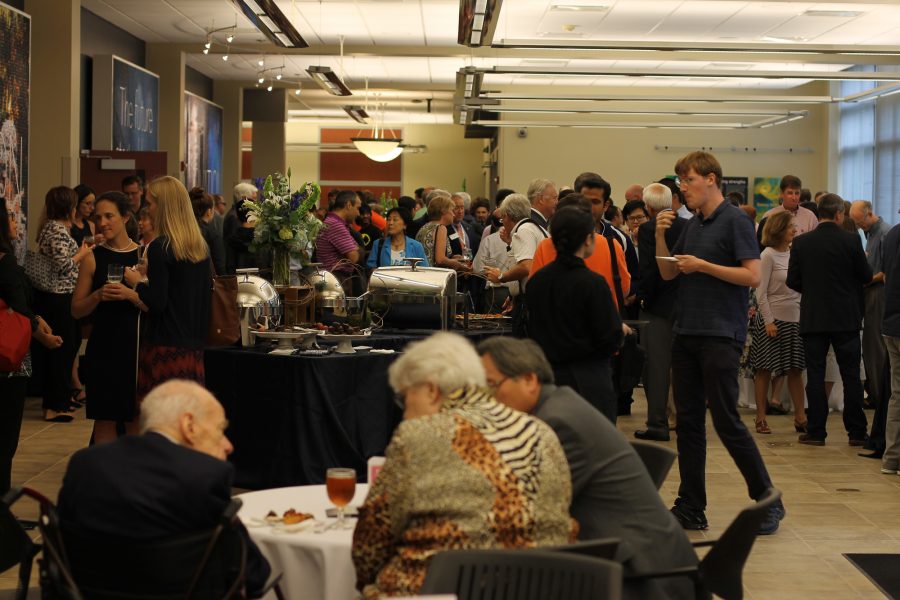NCSA celebrates 30th anniversary
Guest at the NCSA 30th Anniversary Reception on Friday, September 16th, 2016
September 19, 2016
The National Center for Supercomputing Applications (NCSA) celebrated its 30th anniversary Friday, with a reception outlining what it has accomplished throughout the years.
Ed Seidel, director of NCSA, began his time at the institution in 1989 as a post doctorate for the NCSA’s founder Larry Smarr.
“At that time, supercomputing was sort of taking the world by storm, it was changing the way people did science, it was changing industry and industrial competitiveness in the country,” he said. “And a lot of that came out of NCSA, with the center that Larry Smarr started.”
Both Smarr and Seidel were present at the NCSA’s celebration reception, which was held at the NCSA building. President Timothy Killeen, Interim Chancellor Barbara Wilson, Dean of Engineering Andreas Cangellaris and Provost Ed Feser were also in attendance.
The event began with appetizers and drinks for attendees, followed by speeches from NCSA, the National Science Foundation (NSF) and University leaders such as Chancellor Wilson.
Get The Daily Illini in your inbox!
John Towns, the executive director for science and technology at NCSA, was also present at the event.
“There have been a number of things that have come out of NCSA that have been quite important to a very broad community,” he said.
Towns leads the NCSA’s Extreme Science and Engineering Discovery Environment (XSEDE) initiative, which recently got an award for $110 million from NSF.
“(NCSA) evolved in many ways and really for two purposes,” he said. “One is in response to the community that we live in, and the other is in trying to get ahead of things and trying to lead the way into new areas.”
Seidel said that NCSA and supercomputing had a significant impact on different industries, such as pharmaceutical, airplane construction and even climate change.
During the event, a video was shown that explained one of the industries that NCSA is involved with: crop science. Scientists at NCSA work together with crop scientists to study, through computer visualizations, how climate change is affecting crops.
Towns and Seidel both agreed that a major contribution of NCSA is its ability to integrate different disciplines, including the sciences and the humanities.
“All scholarship is in fact impacted a lot by computing,” Seidel said. “This place had a lot to do with that.”
Towns said throughout the 1990s, there were a lot of collaborations between NCSA and the University. Due to decreased funding in the 2000s, he said the number of those partnerships decreased.
“Particularly with Ed Seidel’s taking the role of director, he has made a really strong point of rebuilding that,” he said. “Over the past two years we have significantly increased the number of students that are at the center.”
He elaborated by saying that around 100 to 150 students are currently involved at NCSA in some way, with the majority of students being involved in research.
“I’ve focused a lot on making it possible for different colleges and different departments across the entire campus to work together closely with NCSA,” Seidel said. “And then NCSA is one of the elements that helps the entire University move forward, to be nimble in the 21st century.”
TelNet, released by NCSA in the 1980s, became very broadly used in the community as a program to log into remote supercomputer systems directly, Towns said.
He said NCSA also created Mosaic in the early 1990s, which was the first web browser and “the predecessor of all web browsers today.”
Moving forward, Seidel said NCSA hopes to remain a leader in supercomputing.
“Though NCSA has had difficult times in its past, it’s really positioned to be quite successful going forward,” Towns said.







